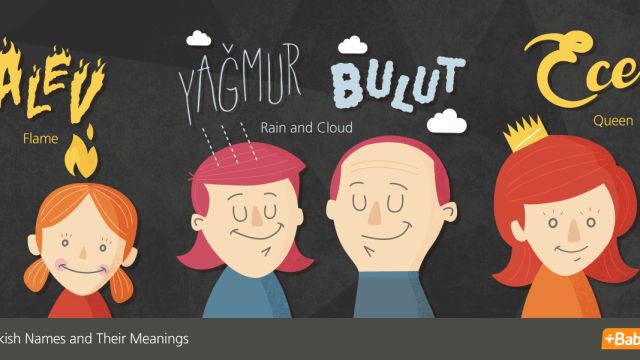My name is Fideniz Ercan. I’m the Turkish language project manager at Babbel. As my name suggests, my parents are from Turkey. And you’re about to learn what Turkish names give away besides just origin.
Turkish names are found in all aspects of life. These are often everyday words such as love (Sevgi), wish (Dilek), luck (Uğur), hope (Ümit) and free (Özgür). This is an especially big plus for those learning Turkish. Because when they discover the meaning of a name, they can immediately add another word to their vocabulary.

In my family – my brother, Peace (Barış) and my cousins Flower Bud (Gonca) and Flame (Alev) – we like to joke about this and carry these names over into our everyday communication. When we do, we come up with phrases like “Aunt Roselayer, have you asked Aunt Air if she and Flame are also coming to breakfast at Aunt Morning and her daughter Summer Wind that Blows in from the Land to the Sea’s place?”
Especially beloved elements in Turkish names are Moon and Stars. This is how names can sound like they come straight out of 1001 Nights: Aykut – Blissful Moon, Mehtap – Moonlight, Sonay – Last Moon, Yıldız – Star, Aylin – Circle of Light around Moon and Stars.
Very often, parents give their children similar-sounding or thematically-related names, as is the case with a brother and sister I know. The older brother’s name is Bulut (Cloud), the younger sister Yağmur (Rain). These are two very typical and beautiful names – assuming they’re pronounced correctly! Unfortunately, it isn’t always so easy for English native-speakers to get them right. That’s how the wonderful name Yağmur becomes “Yagmoor” and Gonca becomes “Gonker”. If you’re now unsure whether you’re pronouncing the names of your friends or acquaintances correctly, I recommend you take a look at our Turkish Pronunciation Course. Here, you’ll also learn what the difference is between Erkan and Ercan.
The world of Turkish names is very diverse and eccentric. Parents also name their children Yiğit (brave), Mert (honest, manly) or Ece (queen) in the hope that the name will also influence the child’s personality. Take the case of the well-known Turkish soccer players, the Altıntop brothers, Hamit and Halil. Altın means gold, top is the ball – the Goldball brothers! Merely a coincidence? Sometimes you don’t have the best luck with names, though. What does the surname Deli (crazy) say about a person? It really exists, too! But that’s okay, we can’t choose our last names. You can also make use of the colorful world of Turkish names and create a beautiful artist name from it. The result is names for Turkish arabesque singers such as Sweet Voice, Strong Voice or Red Rose. Meanwhile, first names are getting more and more outlandish. A well-known Turkish actor and talk show host recently named his daughter Istanbul. But if there’s someone named Paris, then why not Istanbul, too?!
If this has made you curious and you’re asking yourself what could be hidden behind the names of your neighbors or friends (or how you pronounce them), then I’d like to recommend our new Turkish Course “My Name is Cloud – Turkish Names and Their Meanings”! Besides many new words, you’ll also learn how to recognize the political orientation of a family just by its name. Have fun learning and discovering!
